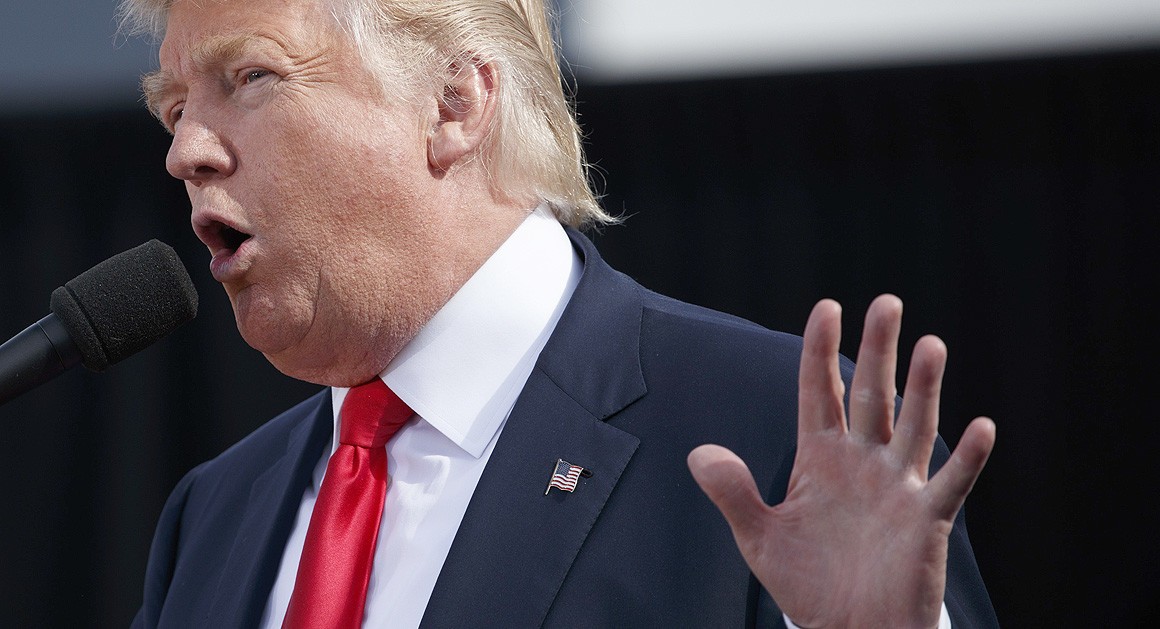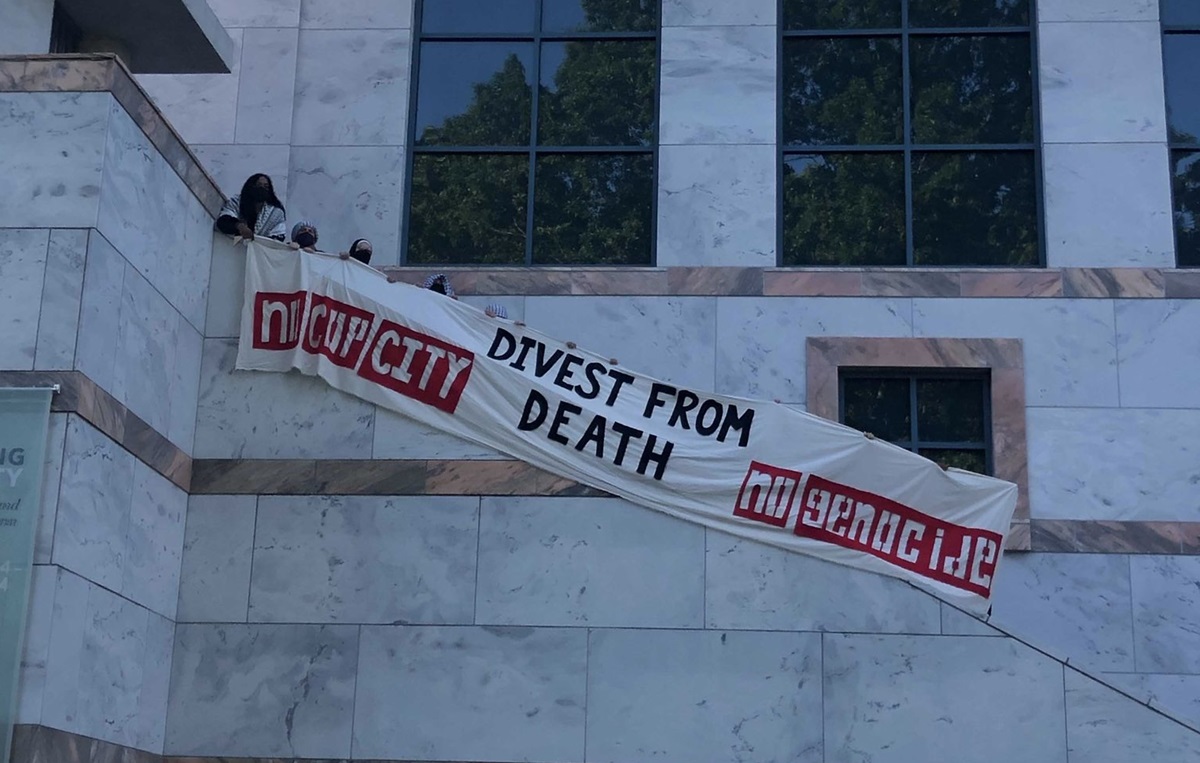Filed under: Analysis, Anarchist Movement, Anti-fascist, The State, US

By Jeff Shantz
In fascism, the monsters of childhood come true.
– Theodor Adorno
In the words of tragic cultural theorist, and victim of actual fascism, Walter Benjamin, “Behind the rise of every fascism is a failed revolution.” A contribution of the Frankfurt School is thinking through the connection of the failed revolutions and fascism. While Trumpism might differ from historic fascism in not following a failed revolution (unless one looks at the failings of a mass movement like Occupy which is a stretch) it does respond to the failings of hopeful liberalism.
This is expressed in terms of fear and a seeking for comfort among those who feel or perceive a loss of status. Understanding rebellion and resistance in the current period also must involve coming to grips with the Trumpist counter-revolution and currents running through it.
How might the Trump phenomenon, and seemingly rising proto-fascism, be understood? While it is still early in the development of Trumpism (it is also late in terms of stopping real social harms from being inflicted) some outlines can be drawn.
Deceiving The Crowd
Trump can readily be situated within historical trajectories of fascism and Right wing populism. One can look to the historical social and psychological conditions of the nineteenth century. Then too popular progressive movements from below, including anarchism, were (quite rightly) viewed as a challenge to conservative elites. The growth of the masses in democracy raised concerns for elites about how to preserve their rule. Elite concern over these movements was the subject of numerous public discussions. Examples of social scientific writing on this include Gustave LeBon’s The Crowd and The Psychology of Revolution and John Henry Mackay’s Extraordinary Popular Delusions and the Madness of Crowds.
In The Crowd LeBon recommends mass deception to ensure a favorable outcome for elites. In the approach outlined by LeBon, conservative elites cannot actually practice democracy but must deceive the masses to appear to be doing so. One might pursue this argument in thinking about the role of so-called fake news and alternative truths in the Trumpist mobilization and the centrality they find among his key organizers like Kellyanne Conway. LeBon focused on supposedly irrational crowds that could be used by demagogues. LeBon was cited favorably by Mussolini and Hitler.
Passive democracy is no match for the power of the myth to mobilize the masses. This perspective finds an echo in the work of Georges Sorel and his emphasis on social myth. Sorel identifies the supposedly irrational in politics. In his view political actors must understand feelings that move the masses to action. LeBon speaks of elite manipulation. Sorel focuses on popular mobilization. These tendencies are combined in the figure and action of Mussolini. This convergence is reproduced in the Trumpist movement.
Nazi theorist of political power Carl Schmitt suggests conservatives must play the democratic game in order to maintain power. According to Andrew Sullivan, Trump is a result of too much democracy. Trump is of the crowd, by the crowd, for the crowd.
Precursors to Trumpism can be found in the works of Gottfried von Herder and Joseph de Maistre. In Trumpism, the artist of Romanticism is transferred to the entrepreneur or magnate who is presented as an artist (the art of the deal). The supposed genius of the entrepreneur, the “art of the deal” is contrasted with the supposed mediocrity of the mass and the degeneracy of the political establishment (the corrupt hacks of the swamp of Washington). Fascism proposes an elite that can save the nation from the degenerate state. This makes clear the choices made by Trump in his cabinet. The cabal of millionaires and billionaires are the elite who will bring about national rebirth. The ones posed as “doers.” They will make America great again. (Notably, Kevin O’Leary a financial blowhard and reality TV star is running for leadership of the Conservative Party in Canada as one of the entrepreneurial “doers,” his word, who will make Canada great again also).
The Trauma of Neoliberalism
To understand the response to Trumpism one must also understand the trauma of neoliberalism, the context of popular dissatisfaction fear, and hope. The advent of neoliberalism initiates a crisis period (see Shantz 2016, Crisis States). This involves punitive accumulation and a redoubled accumulation of wealth for the wealthy. The neoliberal period can be understood as a traumatic period of four decades. Social trauma. Margaret Thatcher even referred to “a short, sharp, shock.”
Fundamentally, neoliberalism has changed and dismantled processes of socialization and mutual aid. Indebtedness and a sense of being alone in your own debt. It is your responsibility alone in a context of declined social support. Supporters are people dispossessed and feeling left out or feeling threatened economically. This is a sense of being dispossessed or not cared for by society. Neoliberal trauma is a loss of power as a collective capacity to act. Dislocation and isolation are conditions ripe for authoritarianism (both are central to Hannah Arendt’s account of authoritarianism).
Clinton, foolishly, took on the task of reducing expectations and denying people their frustrations. She played a role of lessening the experienced impacts of neoliberalism. Impacts that Trump acknowledged and affirmed. Sanders offered another story of the white working class, if in limited, constrained, terms. Clinton held a bond to the failed program of neoliberalism. This was a condition for Trump’s victory.
Properly understanding Trumpism perhaps requires a theory of trauma related to association with the aggressor. In an actual assault, one can get through with support and understanding. Hypocrisy gives victims a sense of abandonment. This leads to compliance. You perceive things as you are supposed to not according to your own feelings. One has to give up critical thinking since it raises possibilities of separation. You comply so you belong. Any feeling of abandonment can evoke this. This is associated with feelings of shame.
Compliance is a response when society does not accept or value someone for who they are. There is an intimate connection between neoliberalism and hyper-responsibility. Issues of inequality and injustice are viewed as being the individual’s fault. Society does not owe you anything (unless you are wealthy, in which case you are owed tax breaks, grants, subsidies because of your greater contributions to a trickle down economy that will benefit everyone).
A response is compliance and omnipotent fantasy. Excess can be directed toward scapegoats. This relates to a sense of exceptionalism and belonging for those who align with the authority. A reality of compliance is expressed through a rhetoric of standing up for oneself. People whose trauma has been invalidated need their trauma to be known. Trumpism expresses a move from individual trauma to social trauma. There is an individual sense of loneliness and sense of dispossession.
An Agitator-In-Chief
The crowd is typically understood by theorists like LeBon in relation to the agitator. Trump is an agitator rather than an insurrectionist. The agitator focuses on groups who can be targeted. The agitator does not want followers to think too much.
There is an attempt to individualize the mob in the form of the figure. The figure will tolerate reality for them. What they cannot tolerate, the figure can and will. He speaks to discreet self-identified groups who identify in terms of losers (in trade, globalization, internationalism, metropolitanism, etc.) but not as classes. Agitation uses emotional tools to reinforce the power structure. The agitator differs from revolutionaries and reformers.
Trump is an over-inflated narcissist. He appears, on surface, to have none of the insecurities his followers are trying to escape. He is the mirror they look into and wish to see themselves. He is appealing to people who otherwise feel powerless. Secondary narcissism stimulates feelings of belonging and loss. Trump, unlike his followers, exhibits no self-questioning, no self-doubt. This is a great relief to his supporters. He is shameless, he has no shame. Refusal to feel shame is a guide to people. Trump expresses a politics of shame and a politics of repugnance.
Fascism promises certainties. It promises a return to more easily understood or familiar conditions for sectors of the population who feel threatened with loss of standing or position (these are often middle strata groups that feel economically insecure or threatened with decline rather than the poor).
Regular folks who support Trump (even as he represents elite interests) can see Trumpism as making the country great again while they are largely able to continue on with their lives. It does not ask much of them but promises much (even if it never delivers on those specific promises). The imagined community or imaginary love of a powerful leader emerges as an outlet for repressed drives even if the program is not realized. Charismatic nationalism offers narcissistic gratification and an outlet for repressed drives against the externalized other.
On Fake News and Alternative Facts
It has been well remarked that Trump shows a contemptuous regard for truth or facts. He is appealing to the constrained who do not want to be hemmed in or constrained by facts either, as they are by so much else in their lives. This is related to the wish to win that Trump so effectively conjured during his campaign (with his repeated emphasis on America winning again, winning huge, etc.).
Primacy of the wish to win is related to the sense to which one feels dispossessed. Trump tells an emotional truth for his supporters even if he is widely seen to be lying. This truth is his anger and the affirmation of his followers’ anger. This is the truth that comes to matter, a point rational critics generally overlook or misread. Omnipotent fantasy cannot be told the factual truth. There is a turn to emotional truth. Trust is based not on his truth claims but on the sense that he will do what really needs to be done. His supporters trust his promised power.
There is a libidinal investment of the masses in the leader. They have fallen in love with him. The crowd enjoys vicariously through the leader. Trump, on their behalf will restore the lost narcissistic idea of the nation. He will “Make America Great Again.”
Critical thinking isolates you and isolation is part of the problem in neoliberal societies. There is a pleasure in feeling free from thinking. It is partly presented as a reaction against the constant thinking through of political correctness (doing what you are supposed to do and thinking through the implications of all utterances, let alone actions). So-called political correctness (simple decency perhaps) is constructed as an artificial strategy that maintains hypocrisy.
Unknowing is derided but critics fail to see the enjoyment it can provide. Ignorance can indeed be bliss. Trump represents a poverty of ideas. He expresses a cathartic change. Trump is a grotesque character type. In the enactment of aggression, Trump is both a fool and a wizard.
Trump speaks the analytic session: be spontaneous; speak the repressed; no emphasis on truth; free association. Trump brings the language and posture of the analytic session. What of the return of the repressed? What is repressed is fear and hatred of the other.
Conclusion
Living with fascism has been the underbelly of US politics for a very long time. It is not coming, it has been there. Frankfurt School theorists Max Horkheimer and Erich Fromm did not see the United States as immune to fascism. Their view is developed significantly in the largely forgotten “Studies in Prejudice.” See also The Authoritarian Personality and an earlier study on anti-Semitism in the US.
Fascist tendencies exist in all modern capitalist societies. This was true even after the defeat of fascism in World War Two. Resentment has been mobilized against the post-war social welfare state and union movements. It has focused on the progressive redistribution of wealth, particularly as it has benefited members of minority groups.
From the 1980s on there has been a reversal of these tendencies as state capitalist regimes have abandoned welfare state policies in favor of Crisis State arrangements (Shantz 2016). This shifted has been effected under the so-called neoliberal consensus for state managers. The turn to neoliberalism coincides with the rise of a new generation of Right wing parties. At the same time this period has seen the decline of communist and socialist parties and movements in the West. There is a rise to prominence of Right wing parties and fascist groups. This is happening everywhere. Russia and Putin. India. Much of the blame belongs with failed democratic, labor, and social democratic parties that still refuse to break with neoliberalism. Trump breaks with neoliberal consensus. This is expressed in his election opposition to trade deals.
What the Left wishes to secure through cultural means (recognition and inclusion) the fascists will actually secure through material and military means. The challenge of Trumpism is also a challenge to rethink positive resistance politics. There is certainly a need for the Left to re-evaluate its politics. On the Left, there has been a loss of the language of solidarity as a shared fate. And a politics unrestrained by economics or program.
Further Reading
LeBon, Gustave. 2002 [1895]. The Crowd: A Study of the Popular Mind. New York: Dover
Shantz, Jeff. 2016. Crisis States: Governance, Resistance & Precarious Capitalism. Brooklyn: Punctum




